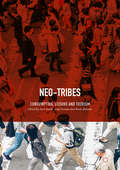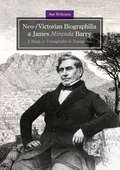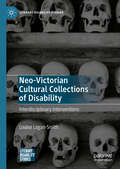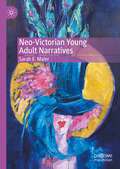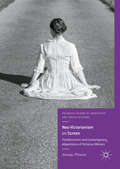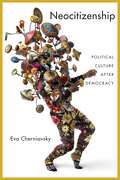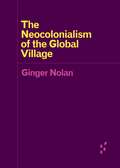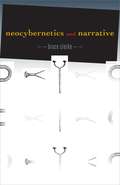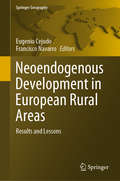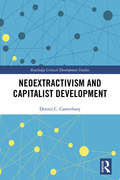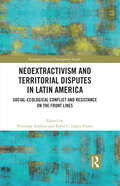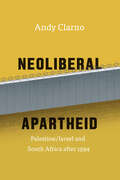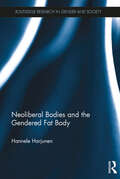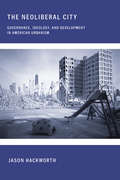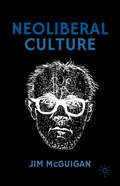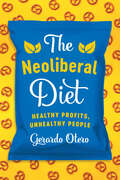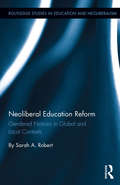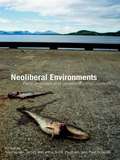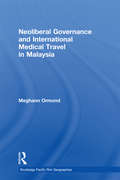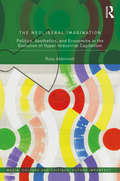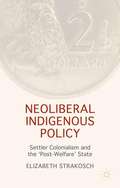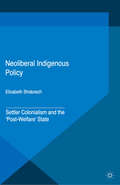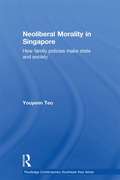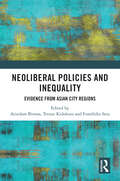- Table View
- List View
Neo-Tribes: Consumption, Leisure And Tourism
by Anne Hardy Andy Bennett Brady RobardsThis collection brings together perspectives drawn from a range of international scholars who have conducted research into the applications of neo-tribal theory. The concept of the neo-tribe was first introduced by the French sociologist Michel Mafessoli (1996) to describe new forms of social bonds in the context of late modernity. This book critically explores the concepts that underpin neo-tribal theory, using perspectives from different disciplines, through a series of theoretically informed and empirically rich chapters. This innovative approach draws together a recently emergent body of work in cultural consumption, tourism and recreation studies. In doing so, the book critically progresses the concept of neo-tribe and highlights the strengths, weaknesses and the opportunities for the application of neo-tribal theory in an interdisciplinary way.
Neo-/Victorian Biographilia and James Miranda Barry: A Study in Transgender and Transgenre
by Ann HeilmannSenior colonial officer from 1813 to 1859, Inspector General James Barry was a pioneering medical reformer who after his death in 1865 became the object of intense speculation when rumours arose about his sex. This cultural history of Barry’s afterlives in Victorian to contemporary (neo-Victorian) life-writing (‘biographilia’) examines the textual and performative strategies of biography, biofiction and biodrama of the last one and a half centuries. In exploring the varied reconstructions and re-imaginations of the historical personality across time, the book illustrates that the ‘real’ James Barry does not exist, any more than does the ‘faithful’ biographical, biofictional or biodramatic rendering of a life in a generically ‘stable’ and discrete form. What Barry represents and how he is represented invariably pinpoints the speculative and the performative: reflections and refractions in the looking glass of genre. Just as ‘James Miranda Barry’, as a subject of cultural inquiry, comes into being and remains in view in the act of crossing gender, so neo-Victorian life-writing constitutes itself through similar acts of boundary transgression. Transgender thus finds its most typical expression in transgenre.
Neo-Victorian Cultural Collections of Disability: Interdisciplinary Interventions (Literary Disability Studies)
by Louise Logan-SmithThis book offers new readings and interpretations of the non-normative narratives of ‘freak show’ performers in the Victorian period as they have been reimagined by contemporary fictions, museum exhibitions and other aspects of the heritage experience. The growth of scholarly interest in institutional histories has been mapped by a surge of neo-Victorian fiction about historical performers with disabilities, supported by scholarship in response to these representations. This study offers the first extensive analysis of the continued display of the bodies and artefacts of historical figures linked to the freak show, and the significant theoretical connections between these displays and broader cultural and fictional representations. It argues that museum displays, archives and fictional adaptations intersect through a much more complex and intriguing dialogue than has previously been identified, shedding light on the way in which historical disability functions in the twenty-first century.
Neo-Victorian Young Adult Narratives
by Sarah E. MaierNeo-Victorian Young Adult Narratives examines the neo-Victorian themes and motifs currently appearing in young adult fiction—specifically addressing the themes of authorship, sexuality, and criminality in the context of the Victorian age in British and American cultures. This book explicates the complicated relationship between the Victorian past and the turn to Victorian modes of thought on literature, history, and morality. Additionally, Sarah E. Maier aims to determine if the appeal of neo-Victorian young adult fiction rests in or resists nostalgia, parody, and revision. Given the overwhelming prevalence of the Victorian in the young adult genres of biofiction, juvenile writings, gothic, sensation, mystery, and crime fiction, there is much to investigate in terms of the friction between the past and the present.
Neo-Victorianism on Screen
by Antonija PrimoracThis book broadens the scope of inquiry of neo-Victorian studies by focusing primarily on screen adaptations and appropriations of Victorian literature and culture. More specifically, this monograph spotlights the overlapping yet often conflicting drives at work in representations of Victorian heroines in contemporary film and TV. Primorac's close analyses of screen representations of Victorian women pay special attention to the use of costume and clothes, revealing the tensions between diverse theoretical interventions and generic (often market-oriented) demands. The author elucidates the push and pull between postcolonial critique and nostalgic, often Orientalist spectac≤ between feminist textual interventions and postfeminist media images. Furthermore, this book examines neo-Victorianism's relationship with postfeminist media culture and offers an analysis of the politics behind onscreen treatment of Victorian gender roles, family structures, sexuality, and colonial space.
Neocitizenship: Political Culture after Democracy
by Eva CherniavskyHow political realities are formed when the government ceases to be a guarantor of rights and democracyNeocitizenship explores how the constellation of political and economic forces of neoliberalism have assailed and arguably dismantled the institutions of modern democratic governance in the U.S. As overtly oligarchical structures of governance replace the operations of representative democracy, the book addresses the implications of this crisis for the practices and imaginaries of citizenship through the lens of popular culture. Rather than impugn the abject citizen-subject who embraces her degraded condition, Eva Cherniavsky asks what new or hybrid forms of civic agency emerge as popular sovereignty recedes. Drawing on a range of political theories, Neocitizenship also suggests that theory is at a disadvantage in thinking the historical present, since its analytical categories are wrought in the very historical contexts whose dissolution we now seek to comprehend. Cherniavsky thus supplements theory with a focus on popular culture that explores the de-democratization for citizenship in more generative and undecided ways. Tracing the contours of neocitizenship in fiction through examples such as The White Boy Shuffle and Distraction, television shows like Battlestar Galactica, and in the design of American studies abroad, Neocitizenship aims to take the measure of a transformation in process, while evading the twin lures of optimism and regret.
The Neocolonialism of the Global Village (Forerunners: Ideas First #55)
by Ginger NolanUncovering a vast maze of realities in the media theories of Marshall McLuhan The term &“global village&”—coined in the 1960s by Marshall McLuhan—has persisted into the twenty-first century as a key trope of techno-humanitarian discourse, casting economic and technical transformations in a utopian light. Against that tendency, this book excavates the violent history, originating with techniques of colonial rule in Africa, that gave rise to the concept of the global village. To some extent, we are all global villagers, but given the imbalances of semiotic power, some belong more thoroughly than others. Reassessing McLuhan&’s media theories in light of their entanglement with colonial and neocolonial techniques, Nolan implicates various arch-paradigms of power (including &“terra-power&”) in the larger prerogative of managing human populations.Forerunners: Ideas First is a thought-in-process series of breakthrough digital publications. Written between fresh ideas and finished books, Forerunners draws on scholarly work initiated in notable blogs, social media, conference plenaries, journal articles, and the synergy of academic exchange. This is gray literature publishing: where intense thinking, change, and speculation take place in scholarship.
Neocybernetics and Narrative (Posthumanities #29)
by Bruce ClarkeNeocybernetics and Narrative opens a new chapter in Bruce Clarke&’s project of rethinking narrative and media through systems theory. Reconceiving interrelations among subjects, media, significations, and the social, this study demonstrates second-order systems theory&’s potential to provide fresh insights into the familiar topics of media studies and narrative theory. A pioneer of systems narratology, Clarke offers readers a synthesis of the neocybernetic theories of cognition formulated by biologists Humberto Maturana and Francisco Varela, incubated by cyberneticist Heinz von Foerster, and cultivated in Niklas Luhmann&’s social systems theory. From this foundation, he interrogates media theory and narrative theory through a critique of information theory in favor of autopoietic conceptions of cognition. Clarke&’s purview includes examinations of novels (Mrs. Dalloway and Mind of My Mind), movies (Avatar, Memento, and Eternal Sunshine of the Spotless Mind), and even Aramis, Bruno Latour&’s idiosyncratic meditation on a failed plan for an automated subway. Clarke declares the era of the cyborg to have ended, laid to rest as the ontology of technical objects is brought into differential coordination with operations of living, psychic, and social systems. The second-order discourse of cognition destabilizes the usual sense of cognition as conscious awareness, revealing the possibility of nonconscious and nonhuman forms of sentience.
Neoendogenous Development in European Rural Areas: Results and Lessons (Springer Geography)
by Eugenio Cejudo Francisco NavarroThis book is one of the main outcomes of the projects “Development Programmes and Rural Change in the European Union: governance, results and lessons to share”and “Successes and failures in the practice of neoendogenous rural development in the European Union (1991-2013)”, funded both of them by the Spanish Ministry of Economy and Competitiveness. This publication aims, on one side, to clarify and deepen the knowledge of the social, economic and territorial effects of the LEADER approach, and, on the other, to analyze the importante of the participation of several stakeholders (young people and women) as well as some traditional activities –agriculture- or modern ones (tourism) linked all of them to the rich cultural and natural heritage of these areas. It also provides an in-depth study of the causes that lead to the generation of successful projects in the practice of neoendogenous rural development and also explores the reasons that cause certain projects to fail in the path towards LEADER support so that they are finally not implemented. In addition, it is shown the problems, results and best practices that cause the neoendogenous rural development in different areas inside of the European Union: Austria, Finland, France, Germany, Italy, Spain and United Kingdom. Thereby it helps to improve the decision-making in rural development, both on a local and regional scale.The multidisciplinary and international character of the authors, as well as the specificity of the research trajectory of each of them, in the analysis of rural development, enriches the publication and facilitates the different and critical reflections on the contributions, errors and meaning of the neoendogenous local development. Researchers in this discipline and technicians working in the practice of rural development along the European Union are the main audience of the book.
Neoextractivism and Capitalist Development (Routledge Critical Development Studies)
by Dennis C. CanterburyThe large-scale extraction of natural resources for sale in capitalist markets is not a new phenomenon, but in recent years global demand for resources has increased, leading to greater attention to the role of resource extraction in the development of the exporting countries. The term neoextractivism was coined to refer to the complex of state-private sector policies intended to utilize the income from natural resources sales for development objectives and for improving the lives of a country's citizens. However, this book argues that neoextractivism is merely another conduit for capitalist development, reinforcing the position of elites, with few benefits for working people. With particular reference to the role of neoextractivism within Latin America and the Caribbean, using Guyana as a case study, the book aims to provide readers with the tools they need to critically analyze neoextractivism as a development model, identifying alternative paths for improving the human condition. This book will be of interest to academics and students in the fields of international development, political economy, sociology, and globalization, as well as to policymakers and political activists engaged in social movements in the natural resources sector.
Neoextractivism and Territorial Disputes in Latin America: Social-ecological Conflict and Resistance on the Front Lines (Routledge Critical Development Studies)
by Penelope Anthias Flores, Pabel C. LópezThis book reflects on the continuing expansion of extractive forms of capitalist development into new territories in Latin America, and the resistance movements that are trying to combat the ecological and social destruction that follows. Latin American development models continue to prioritise extractivism: the intensive exploitation and exportation of nature in its primary commodity form. This constant expansion of the extractive frontier into new territories leads to a continuing process and dialectic of colonization, de-colonization and re-colonization which the authors describe as ‘territorialities in dispute’. This book uncovers the underlying trends and dynamics of these territorialities in dispute, and the socio-ecological resistance movements that are emerging as marginalised communities struggle to reclaim their territorial rights and defend and protect their right of access to the global commons. A focus on territorialities in dispute renders visible the unsustainable expansion of extractivist territories and opens up new horizons to learn from these processes and to consider post-extractivist/post-development imaginings of another world and alternate futures. This book will be of interest to both students and researchers in the fields of international development, political ecology, critical geography, social anthropology, as well as to activists engaged in socio-ecological/eco-territorial movements.
Neoliberal Apartheid: Palestine/Israel and South Africa after 1994
by Andy ClarnoIn recent years, as peace between Israelis and Palestinians has remained cruelly elusive, scholars and activists have increasingly turned to South African history and politics to make sense of the situation. In the early 1990s, both South Africa and Israel began negotiating with their colonized populations. South Africans saw results: the state was democratized and black South Africans gained formal legal equality. Palestinians, on the other hand, won neither freedom nor equality, and today Israel remains a settler-colonial state. Despite these different outcomes, the transitions of the last twenty years have produced surprisingly similar socioeconomic changes in both regions: growing inequality, racialized poverty, and advanced strategies for securing the powerful and policing the racialized poor. Neoliberal Apartheid explores this paradox through an analysis of (de)colonization and neoliberal racial capitalism. After a decade of research in the Johannesburg and Jerusalem regions, Andy Clarno presents here a detailed ethnographic study of the precariousness of the poor in Alexandra township, the dynamics of colonization and enclosure in Bethlehem, the growth of fortress suburbs and private security in Johannesburg, and the regime of security coordination between the Israeli military and the Palestinian Authority in the West Bank. The first comparative study of the changes in these two areas since the early 1990s, the book addresses the limitations of liberation in South Africa, highlights the impact of neoliberal restructuring in Palestine, and argues that a new form of neoliberal apartheid has emerged in both contexts.
Neoliberal Bodies and the Gendered Fat Body: The Fat Body in Focus (Routledge Research in Gender and Society)
by Hannele HarjunenIn recent decades the rise of the so-called "global obesity epidemic" has led to fatness and fat bodies being debated incessantly in popular, professional, and academic arenas. Fatness and fat bodies are shamed and demonised, and the public monitoring, surveillance and outright policing by the media, health professionals, and the general public are pervasive and socially accepted. In Neoliberal Bodies and the Gendered Fat Body, Hannele Harjunen claims that neoliberal economic policy and rationale are enmeshed with conceptions of body, gender, and health in a profound way in contemporary western culture. She explores the relationships between fatness, health, and neoliberal discourse and the role of economic policy in the construction of the (gendered) fat body, and examines how neoliberal discourses join patriarchal and biomedical constructions of the fat female body. In neoliberal culture the fat body is not just the unhealthy body one finds in medical discourse, but also the body that is costly, unproductive and inefficient, failing in the crucial task of self-management. With an emphasis on how neoliberal governmentality, in its many forms, affects the fat body and contributes to its vilification, this book is essential reading for scholars of feminist thought, sociology, cultural studies and social theory with interests in the body, gender and the effects of neoliberal discourse on social attitudes.
The Neoliberal City: Governance, Ideology, and Development in American Urbanism
by Jason HackworthThe shift in the ideological winds toward a "free-market" economy has brought profound effects in urban areas. The Neoliberal City presents an overview of the effect of these changes on today's cities. The term "neoliberalism" was originally used in reference to a set of practices that first-world institutions like the IMF and World Bank impose on third-world countries and cities. The support of unimpeded trade and individual freedoms and the discouragement of state regulation and social spending are the putative centerpieces of this vision. More and more, though, people have come to recognize that first-world cities are undergoing the same processes.In The Neoliberal City, Jason Hackworth argues that neoliberal policies are in fact having a profound effect on the nature and direction of urbanization in the United States and other wealthy countries, and that much can be learned from studying its effect. He explores the impact that neoliberalism has had on three aspects of urbanization in the United States: governance, urban form, and social movements. The American inner city is seen as a crucial battle zone for the wider neoliberal transition primarily because it embodies neoliberalism's antithesis, Keynesian egalitarian liberalism.Focusing on issues such as gentrification in New York City; public-housing policy in New York, Chicago, and Seattle; downtown redevelopment in Phoenix; and urban-landscape change in New Brunswick, N.J., Hackworth shows us how material and symbolic changes to institutions, neighborhoods, and entire urban regions can be traced in part to the rise of neoliberalism.
Neoliberal Culture
by Jim McGuiganNeoliberal Culture presents a critical analysis of the impact of the global free-market - the hegemony of which has been described elsewhere by the author as 'a short counter-revolution' - on the arts, media and everyday life since the 1970s.
The Neoliberal Diet: Healthy Profits, Unhealthy People
by Gerardo OteroThis “remarkable, comprehensive” study of neoliberal agribusiness and the obesity epidemic “is critical reading for food studies scholars” (Contemporary Sociology).Obesity rates are rising across the United States and beyond. While some claim that people simply eat too much “energy-dense” food while exercising too little, The Neoliberal Diet argues that the issue is larger than individual lifestyle choices. Since the 1980s, the shift toward neoliberal regulation has enabled agribusiness multinationals to thrive by selling a combination of meat and highly processed foods loaded with refined flour and sugars—a diet that originated in the United States. Drawing on extensive empirical data, Gerardo Otero identifies the socioeconomic and political forces that created this diet, which has been exported around the globe at the expense of people’s health.Otero shows how state-level actions, particularly subsidies for big farms and agribusiness, have ensured the dominance of processed foods and made fresh foods inaccessible to many. Comparing agrifood performance across several nations, including the NAFTA region, and correlating food access to class inequality, he convincingly demonstrates the structural character of food production and the effect of inequality on individual food choices. Resolving the global obesity crisis, Otero concludes, lies not in blaming individuals but in creating state-level programs to reduce inequality and make healthier food accessible to all.
The Neoliberal Diet: Healthy Profits, Unhealthy People
by Gerardo OteroThis “remarkable, comprehensive” study of neoliberal agribusiness and the obesity epidemic “is critical reading for food studies scholars” (Contemporary Sociology).Obesity rates are rising across the United States and beyond. While some claim that people simply eat too much “energy-dense” food while exercising too little, The Neoliberal Diet argues that the issue is larger than individual lifestyle choices. Since the 1980s, the shift toward neoliberal regulation has enabled agribusiness multinationals to thrive by selling a combination of meat and highly processed foods loaded with refined flour and sugars—a diet that originated in the United States. Drawing on extensive empirical data, Gerardo Otero identifies the socioeconomic and political forces that created this diet, which has been exported around the globe at the expense of people’s health.Otero shows how state-level actions, particularly subsidies for big farms and agribusiness, have ensured the dominance of processed foods and made fresh foods inaccessible to many. Comparing agrifood performance across several nations, including the NAFTA region, and correlating food access to class inequality, he convincingly demonstrates the structural character of food production and the effect of inequality on individual food choices. Resolving the global obesity crisis, Otero concludes, lies not in blaming individuals but in creating state-level programs to reduce inequality and make healthier food accessible to all.
Neoliberal Education Reform: Gendered Notions in Global and Local Contexts (Routledge Studies in Education, Neoliberalism, and Marxism)
by Sarah A. RobertThe restructuring of teaching is a global issue, the result of a transnational movement of policy. Gender shapes the occupational reform and binds the global-to-the-local movement of reform ideas. Gender is also implicated in how policy is done and how it leads to particular outcomes. This volume examines the behind-the-scenes work done to make sense of reform and implement it during the workday and questions the new forms and controls over teaching reforms—the labor process—revealed to understand the implications of neoliberal education reform on teachers’ work. Based on ethnographic research undertaken at public high schools in Argentina, this volume introduces the everyday work lives of teachers. It includes interviews and observations revealing what it means to be a teacher in the reform context, and explores the ways masculinities and femininities shape teachers’ decision-making about reforms. At a time when teachers are at the center of political controversy around the world, this volume is an important reminder that school change is about changing the work of teachers.
Neoliberal Environments: False Promises and Unnatural Consequences
by Nik Heynen James McCarthy Scott Prudham Paul RobbinsThis volume explores the nexus between nature, markets, deregulation and valuation, using theoretically sharp and empirically rich real-world case studies and analyses of actually existing policy from around the world and across a range of resources. In short, it answers the questions: does neoliberalizing nature work and what work does it do? More specifically, this volume provides answers to a series of urgent questions about the effects of neoliberal policies on environmental governance and quality. What are the implications of privatizing public water utilities in terms of equity in service provision, resource conservation and water quality? Do free trade agreements erode the sovereignty of nations and citizens to regulate environmental pollution, and is this power being transferred to corporations? What does the evidence show about the relationship between that marketization and privatization of nature and conservation objectives? Neoliberal Environments productively engages with all of these questions and more. At the same time, the diverse case studies collectively and decisively challenge the orthodoxies of neoliberal reforms, documenting that the results of such reforms have fallen far short of their ambitions.
Neoliberal Governance and International Medical Travel in Malaysia (Routledge Pacific Rim Geographies)
by Meghann OrmondInternational medical travel (IMT), people crossing national borders in the pursuit of healthcare, has become a growing phenomenon. With many of the countries currently being promoted as IMT destinations located in the ‘developing’ world, IMT poses a significant challenge to popular assumptions about who provides and receives care since it inverses and diversifies presumed directionalities of care. This book analyses the development of international medical travel in Malaysia, by looking at the benefits and challenges of providing health care to non-Malaysians. It challenges embedded assumptions about the sources, directions and political value of care. The author situates the Malaysian case study material at the fruitful cross-section of a range of literatures on transnational mobility, hospitality, therapeutic landscapes and medical diplomacy to examine their roles in the construction of national identity. The book thus contributes to wider debates that have emerged around the changing character of global health governance, and is of use to students and scholars of Southeast Asian Studies as well as Politics and Health and Social Care.
The Neoliberal Imagination: Politics, Aesthetics, and Economics in the Evolution of Hyper-Industrial Capitalism (Media, Culture and Critique: Future Imperfect)
by Ross AbbinnettThis book presents a polemical account of the historical development of the neoliberal imagination. Inspired by the thought of Frederic Jameson, Bernard Stiegler, and Timothy Morton, it argues that the evolution of virtual and information technologies has transformed the ideological imaginary of capitalism. Owing to the inseparability of the process of commodification from developments in the sphere of media technology – particularly the rise of the digital networks through which information is processed and disseminated – the aesthetic forms of the neoliberal imaginary are not external to the accelerated productivity and adaptability of human beings. Rather, they are essential both to the vision of progress that informs the technoscientific organization of capitalist society and to the practical formation of ‘the self’ that takes place within its networks. A snapshot of the evolving ‘world picture’ that is formed in the neoliberal imagination as articulated in its particular regime of capitalization, The Neoliberal Imagination will appeal to scholars of social theory and social philosophy with interests in neoliberalism.
Neoliberal Indigenous Policy: Settler Colonialism and the 'Post-Welfare' State
by Elizabeth StrakoschNeoliberal Indigenous Policy
Neoliberal Indigenous Policy: Settler Colonialism and the ‘Post-Welfare’ State
by Elizabeth StrakoschThis book examines recent changes to Indigenous policy in English-speaking settler states, and locates them within the broader shift from social to neo-liberal framings of citizen-state relations via a case study of Australian federal policy between 2000 and 2007.
Neoliberal Morality in Singapore: How family policies make state and society (Routledge Contemporary Southeast Asia Series)
by Youyenn TeoUsing the case study of Singapore, this book examines the production of a set of institutionalized relationships and ethical meanings that link citizens to each other and the state. It looks at how questions of culture and morality are resolved, and how state-society relations are established that render paradoxes and inequalities acceptable, and form the basis of a national political culture. The Singapore government has put in place a number of policies to encourage marriage and boost fertility that has attracted much attention, and are often taken as evidence that the Singapore state is a social engineer. The book argues that these policies have largely failed to reverse demographic trends, and reveals that the effects of the policies are far more interesting and significant. As Singaporeans negotiate various rules and regulations, they form a set of ties to each other and to the state. These institutionalized relationships and shared meanings, referred to as neoliberal morality, render particular ideals about family natural. Based on extensive field work, the book is a useful contribution to studies on Asian Culture and Society, Globalisation, as well as Development Studies.
Neoliberal Policies and Inequality: Evidence from Asian City Regions
by Arindam Biswas, Tetsuo Kidokoro and Fumihiko SetaThis book explores the discourse on urban and regional inequality within the framework of neoliberalism. It analyzes the widespread application of neoliberal policies in Asian city regions and identifies their influence on rising inequality. The book captures inequality through spatial and non-spatial policy narratives with empirical evidence from India, Japan, South Korea, Taiwan, and Thailand. The book uses analytics, narratives and simulation to unfold the opportunities and threats to urban regions that bear the impacts of globalization and neoliberal policies.Lucid and topical, this book will be an essential read for scholars and researchers of urban economics, urban and regional planning, urban studies, urban sociology, political economy, public policy, governance, development studies and Asian economy.
